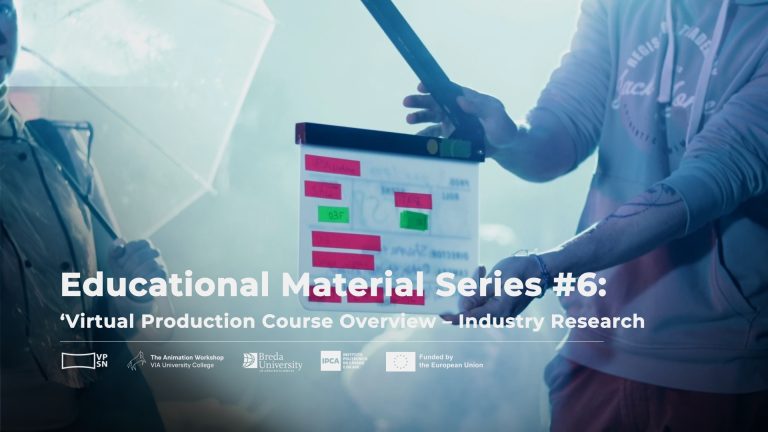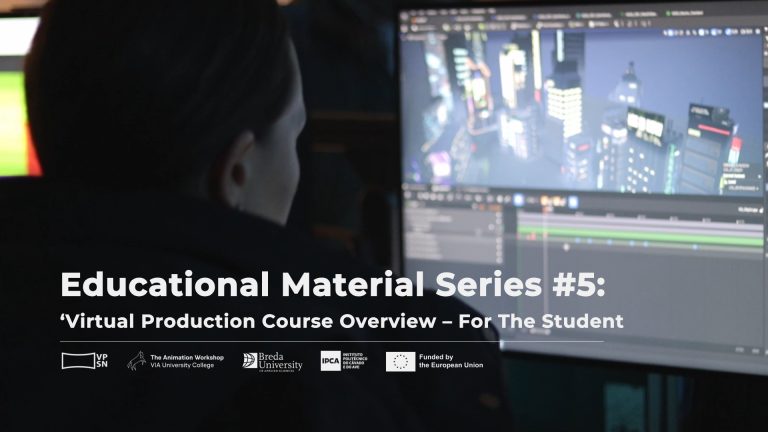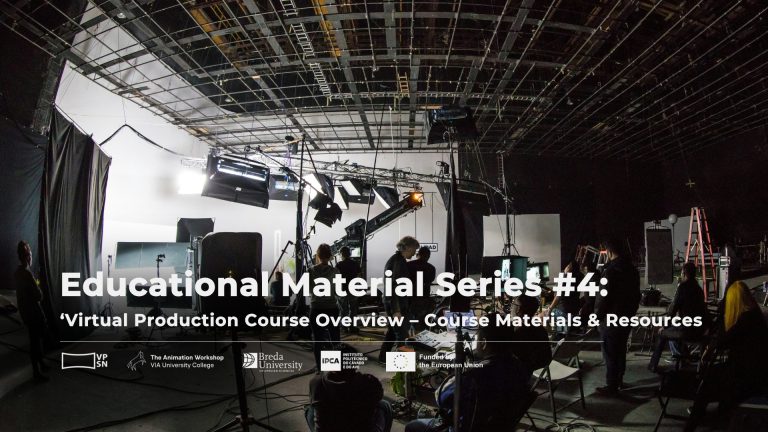
Tuki Clavero
Senior Researcher in Creative & Entertainment Video Games , Academy for Games & Media
Are you curious about the world of Virtual Production (VP)? Dive into our blog post to discover how the VP filmmaking technique is currently moving throughout The Netherlands.
Explore the technology behind VP, the role of Dutch educational institutions, and the impact on the local creative industry. From major studios to educational hubs, the Netherlands is positioning itself as a global player in the VP landscape.
This article and initial research-piece is authored by Tuki Clavero, Senior Researcher at Breda University of Applied Science, and partner of the VPSN project.
Introduction & Background Information about Virtual Production
Virtual Production (VP) is an innovative filmmaking technique that integrates live-action footage with computer-generated imagery (CGI) in real-time, enabling directors, cinematographers, and other production crew members to manipulate virtual environments and assets to pre-visualise the results and support more dynamic alterations during shooting. This innovative approach, known as ‘in-camera VFX’, allows immediate observation of how the foreground and background interact, in contrast to traditional visual effects (VFX) added during post-production using techniques such as greenscreen. This real-time feedback approach benefits directors, creators, and clients, who can instantly see the results and discuss or adjust the ‘virtual set’ details in advance. This process enables real-time creation and capture of visual effects, streamlining film and TV production by shifting work from post- to pre-production. This approach also provides a more natural acting environment for performers, who can see the set instead of green blocks and surfaces.
Virtual Production has gained significant attention in recent years, with high-profile virtual productions and LED volume-enhanced projects such as The Mandalorian, 1899, Avatar: The Last Airbender, and Thor: Love and Thunder. These projects showcase the potential of VP in revolutionising the film industry.
The core technology underpinning VP is the use of real-time game engines, such as Unreal Engine and Unity, which seamlessly blend live-action and digital elements. This filmmaking technique is further enhanced by advancements in LED panels, motion capture, and camera tracking systems, creating an immersive and interactive environment for filmmakers.
Overview of the Virtual Production Industry in the Netherlands
The Netherlands is well-positioned to become a significant player in the Virtual Production landscape due to its strong creative industry, focus on technological innovation, and investment in digital infrastructure. The Dutch film industry has already embraced emerging technologies under the umbrella of ‘Creatieve Industrie’—such as Virtual Reality (VR) and Augmented Reality (AR)—with several pioneering projects and collaborations taking place across the country (examples here, here and here).
Education & Training: The path to expertise
Several educational institutions in the Netherlands, such as Netherlands Film Academy, TU Delft and Breda University of Applied Sciences (BUas), already offer courses and research programs focusing on Virtual Production and related fields.
Although, BUas is currently the only educational institution in The Netherlands with an in-house XR stage featuring ROE LED panels and providing state-of-the-art facilities and equipment, including VICOM motion capture systems, enabling students and researchers to gain hands-on experience with VP technology. BUas also host a yearly Virtual Production Gathering conference, where students and industry professionals can learn about cutting-edge innovations and technologies driving the future of VP technology. Additionally, BUas, in partnership with IRON Films, offers a series of Workshops and Master Classes to address the shortage of specialised talent needed to keep researching and producing solutions for virtual production and prepare future VP specialists.
Industry – the private sector takes the lead
In the private sector, a growing number of Dutch studios and companies are exploring the potential of Virtual Production. For instance, ReadySet Studios, located in Amsterdam, is a production company that enables film and television producers in the Netherlands to take advantage of a large studio set-up. The studio offers a large LED ceiling featuring a 14-metre wide and 5.5-metre-high main screen and an additional smaller LED screen. The first production to use the studio’s high-end facilities is the Dutch drama series “Rampvlucht“. The Senate and House of Representatives frequently feature in this series, but it is an impossible location to shoot at physically. “Virtual Production offered a solution, and we had the locations remodelled digitally and completely credibly in 3D, allowing us to do all the scenes we planned. Virtual Production offers great perspectives for all filmmakers facing these challenges,” said co-founder Florian Legters of ReadySet Studios.
IRON Films is a pioneering company that provides tailor-made Virtual Production studios for individual productions, catering to various needs and budgets. Based in Eindhoven, the company offers the flexibility of hosting productions within their dedicated studio or on location, depending on clients’ requirements. Each customised LED volume set-up is accompanied by a fully equipped BrainBar (the team of artists and engineers operating the equipment that drives a smart stage or any space used for virtual production). IRON Films is a production company that prioritises adaptability and mobility with its mobile Virtual Production set-up.
Studio Lukkien, an Ede-based media company, specialises in advertising, photography, and film. Since 2023, Lukkien has been using its virtual production (VP) set-up for commercials, brand promos, and film productions. In 2022, they invested in a 22×5 metre LED volume, complete with ROE Diamond panels, a Disguise workflow, and Stype tracking. Lukkien’s in-house teams collaborate to create diverse content, including high-end commercials, film productions, and social and online content. Their VP technology allows them to centralise region-specific content production for international brands and effortlessly switch between various locations or adapt settings to cater to different regions.
HeadQ Virtual & Post, formerly known as HeadQ, has recently expanded its focus to include virtual production, building on its 25-year history in post-production services such as video editing, colour grading, and sound design for movies, TV shows, commercials, and corporate productions. Their in-house stage boasts a 130m² space with a 5.2m high acoustically treated ceiling and a soft-lit 180-degree green infinity wall designed explicitly for virtual production. HeadQ Virtual & Post’s portable camera tracking system allows them to accommodate larger stages or outdoor shoots as long as the space meets the required specifications. Additionally, their green screen studio is available for rent without the virtual production equipment, offering flexibility to clients based on their production needs.
The Dutch Foundation for Public Broadcasting (NPO) has also embraced virtual production, as it is advantageous in reducing costs and overcoming challenges presented by smaller budgets and COVID restrictions while also limiting CO2 emissions.
Broadcasters can leverage virtual production to create captivating graphics based on data, incorporating dynamic 3D objects using camera tracking technology for AR elements. This approach enables the creation of virtual productions without the need for physical location shoots and even allows for depicting inaccessible environments, such as a Mars landing.
While virtual production is commonly associated with film and TV, its potential reaches far beyond these domains. The technology is also well-suited for brand marketing and commercial applications, demonstrating its versatility and broad appeal.
These companies, among others, are actively working to advance the VP ecosystem in the Netherlands and contribute to the global conversation surrounding this ground-breaking filmmaking technique.
Conclusion: A bright future for Dutch Virtual Production
Key takeaways about Virtual Production in the Netherlands include the country’s focus on education and training, with institutions like the Netherlands Film Academy, TU Delft, and Breda University of Applied Sciences (BUas) offering courses and research programs in Virtual Production and related fields such as real-time game engines, animation and 3D Visual Arts, Film VFX, and XR technologies.
The private sector in the Netherlands is also making strides, with companies such as ReadySet Studios, IRON Films, Studio Lukkien, and HeadQ Virtual & Post embracing virtual production technology and contributing to its development. The Dutch Foundation for Public Broadcasting (NPO) is also starting to delve into virtual production, demonstrating the technology’s broad appeal and versatility across various domains, including news broadcasts, live events, and educational content.
Numerous prospects and opportunities emerge for Virtual Production in the Netherlands as we look ahead. As the technology continues to advance, driven by innovations in real-time game engines like Unreal Engine and Unity and advancements in LED panels, motion capture, and camera tracking systems, the Dutch film industry is expected to play a significant role in shaping the future of filmmaking. Government support and incentives (such as the subsidy schemes from CLICKNL) could stimulate the adoption of virtual production technologies, attracting international productions and boosting the local creative economy. Collaboration between educational institutions, industry professionals, and international partners will be essential for fostering growth and innovation in the Dutch Virtual Production ecosystem. This approach will positively impact the challenges presented by the talent shortage that needs to be addressed urgently.
As a result, the Netherlands is well-positioned to contribute to the ongoing global conversation surrounding this ground-breaking filmmaking technique. By embracing the opportunities and challenges presented by virtual production, the Netherlands can continue to develop its reputation as a hub for creativity, innovation, and cutting-edge technology in the global film industry.



